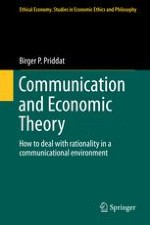2014 | OriginalPaper | Buchkapitel
6. Ludonarrative Dissonance: Economy as a Diversified Language Game Landscape
verfasst von : Birger P. Priddat
Erschienen in: Communication and Economic Theory
Aktivieren Sie unsere intelligente Suche, um passende Fachinhalte oder Patente zu finden.
Wählen Sie Textabschnitte aus um mit Künstlicher Intelligenz passenden Patente zu finden. powered by
Markieren Sie Textabschnitte, um KI-gestützt weitere passende Inhalte zu finden. powered by
